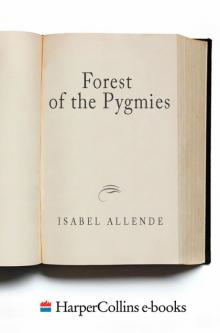- Home
- Isabel Allende
Kingdom of the Golden Dragon Page 2
Kingdom of the Golden Dragon Read online
Page 2
They felt the breath of the great cat on their faces, an exhalation of warm, fetid air escaping from its jaws. Another terrible roar shook the air. The beast approached to within a few inches of the two, so close that they could feel the prick of its stiff whiskers. For several seconds, which seemed eternal, it circled around them, sniffing them and feinting with one enormous paw, but not menacing them. The master and his disciple sat absolutely motionless, leaving themselves open to warmth and compassion, displaying no fear or aggression, only empathy. Once the tiger’s curiosity had been satisfied, it left with the same solemn dignity with which it had come.
“You see, Dil Bahadur, how sometimes calm is effective,” was the lama’s only comment. The prince was unable to answer because his voice had frozen in his breast.
Despite that unexpected visit, master and student decided to stay and spend the night in Chenthan Dzong, but they took the precaution of sleeping near a bonfire, and of keeping within reach a couple of lances they found among the weapons abandoned by the Tao-shu monks. The tiger did not return, but the next morning, when they continued their march, they saw its paw marks on the gleaming snow, and far away they heard its roars echoing among the peaks.
CHAPTER TWO
The Valley of the Yetis
A FEW DAYS LATER, TENSING shouted jubilantly and pointed to a narrow canyon between two vertical faces of the mountain: two black walls polished by millions of years of ice and erosion. They entered the canyon with great caution, scrambling over loose rocks and avoiding deep holes. With each step they had to test the firmness of the terrain with their poles.
Tensing threw a stone into one of the openings, and it was so deep that they never heard it hit bottom. Overhead, the sky was barely visible as a blue ribbon stretching between gleaming walls of rock. They were surprised to hear a chorus of horrifying moans.
“It is fortunate, is it not, that we do not believe in ghosts or demons,” commented the lama.
“Then maybe it is my imagination that is making me hear those wails?” the prince asked, his skin prickling with fright.
“Possibly the wind is blowing through here like air blowing through a trumpet.”
They had progressed a good way when they were assaulted by the stench of rotten eggs.
“Sulfur,” the master explained.
“I can’t breathe,” said Dil Bahadur, pinching his nostrils.
“Perhaps it is best to imagine you are smelling the perfume of flowers,” Tensing suggested.
“‘Of all fragrances,’” the prince recited, smiling, “‘the sweetest is that of virtue.’”
“Imagine, then, that this is the sweet scent of virtue,” the lama replied, laughing.
The pass was approximately a mile in length, but it took them two hours to travel that distance. In some places the passage was so narrow that they had to scoot sideways between the rocks, dizzied by the thin air, but they did not hesitate, because the parchment clearly indicated that there was a way out. They saw niches dug into the walls, which contained skulls and large piles of bones, some seemingly human.
“This must be the Yetis’ cemetery,” Dil Bahadur had commented.
A breath of moist, warm air, like nothing they had ever felt, announced the end of the canyon.
Tensing was the first to step out, followed closely by his disciple. When Dil Bahadur saw the landscape that lay before them, he thought he must be on another planet. If he hadn’t been so weighed down by bodily fatigue, and if his stomach weren’t churning from the stink of the sulfur, he would have thought he had made an astral journey.
“There it is: the Valley of the Yetis,” the lama announced.
Before them stretched a volcanic mesa dotted with patches of harsh gray-green vegetation: dense shrubs and giant mushrooms of various shapes and colors were growing everywhere. They saw rushing streams and bubbling pools of water, strange rock formations, and tall columns of white smoke billowing from the ground. A delicate fog floated on the air, erasing shapes in the distance and giving the valley the look of a dreamscape. The visitors felt they had left reality behind, as if they had entered another dimension. After the intense cold of traveling through the mountains for so many days, that warm vapor was a true gift to the senses despite the lingering, nauseating odor that thankfully was less intense here than in the canyon.
“In olden days, certain lamas, carefully selected for their physical endurance and spiritual fortitude, made this journey once every twenty years to collect the medicinal plants that do not grow anywhere else,” Tensing explained.
He said that in 1950 Tibet had been invaded by the Chinese, who destroyed more than six thousand monasteries and shut down the rest. Most of the lamas left to live in other countries, such as India and Nepal, carrying the teachings of Buddha into exile. Instead of snuffing out Buddhism, as the invading Chinese intended, the lamas accomplished exactly the opposite: they spread it throughout the world. Even so, much of the knowledge about medicine, as well as the lamas’ psychic practices, was lost.
“The plants were dried, ground, and mixed with other ingredients. One gram of those powders may be more precious than all the world’s gold, Dil Bahadur,” his master told him.
“We can’t carry many plants. Too bad we didn’t bring a yak,” the youth commented.
“Possibly a yak would not willingly have crossed these mountains; I do not see a yak keeping its footing with a staff, Dil Bahadur,” said the master. “We will carry what we can.”
They entered the mysterious valley, and after walking for a short time they saw something that resembled skeletons. The lama informed his disciple that they were the petrified bones of animals that roamed before the universal flood. He got down on all fours and began to search the ground until he found a dark rock with red spots.
“This is dragon excrement, Dil Bahadur. It has magical properties.”
“I must not believe everything I hear, is that not true, master?” the youth replied.
“No, but perhaps in this case it is all right to believe me,” the lama said, handing the specimen to his disciple.
The prince hesitated. The idea of touching that stone-hard blob did not appeal to him.
“It is petrified,” laughed Tensing. “It can cure broken bones in only minutes. One pinch of this, ground and dissolved in rice alcohol, can transport you to any of the stars in the firmament.”
The small specimen Tensing had discovered had an opening through which the lama passed a cord and hung it around Dil Bahadur’s neck.
“This is like a shield; it has the power to deflect certain metals. Arrows, knives, and other cutting weapons cannot harm you.”
The youth laughed. “Perhaps it will be an infected tooth, a slip on the ice, or being hit in the head by a rock that will kill me.”
“We will all die; that is the one certainty, Dil Bahadur.”
The lama and the prince made camp beside a warm fumarole, enveloped in its dense column of vapor and happy to spend a comfortable night for the first time in several days. They had made tea with the water from a nearby thermal spring. The water was boiling when it reached the surface, and as the bubbles cooled they turned a pale lavender. The geyser fed a steaming stream that had fleshy purple flowers growing along its banks.
The monk rarely slept, but he would sit for long periods in the lotus position with his eyes half-closed, resting and renewing his energy. He had the ability to remain absolutely motionless, with his mind controlling his breathing, his blood pressure, his heart rate, and his temperature, so that his body entered a state of hibernation. As quickly as he attained absolute rest, he could respond to an emergency, with all his powerful muscles primed to mount a defense. Dil Bahadur had tried for years to imitate him, without success. Exhausted, he fell asleep the moment his head touched the ground.
The prince awakened amid a chorus of terrifying grunts. The instant he opened his eyes and saw what surrounded him, he sprang to his feet, nerves tingling, with his knees bent and arms extended in the attack pos
ition. The tranquil voice of the master stopped him just as he was preparing to strike a blow.
“Be calm. These are Yetis. Send them waves of warmth and compassion, as you did to the white tiger,” the lama murmured.
They were encircled by a horde of repulsive creatures about four and a half feet tall, covered from head to toe in tangled, filthy white fur; their arms were long, and their short, bowed legs ended in enormous feet like a monkey’s. Dil Bahadur could imagine that the tracks of those huge feet were the source of the legend about them. But then, to whom did the long bones and gigantic skulls they’d seen in the tunnel belong?
The small stature of the creatures in no way diminished their ferocious appearance. Their flat, hairy faces were almost human, but their expressions were bestial; their eyes were small and round, their ears pointed like a dog’s, and their teeth were long and sharp. Between grunts, they extended dark purplish-blue tongues that curled at the tip, like a reptile’s. Over their chests they wore blood-splattered breastplates that were tied at the shoulder and waist. They were brandishing menacing clubs and sharpened rocks, but despite their weapons and the fact that they greatly outnumbered the newcomers, they were keeping a prudent distance. It was beginning to grow light, and the early dawn, veiled in thick fog, lent a nightmarish tone to the scene.
Tensing got to his feet, slowly, in order not to provoke a reaction from their “welcoming committee.” Compared to the giant lama, the Yetis seemed even more squat and misshapen. The master’s aura had not changed color; it was still gold and white, which reflected his perfect serenity, while the flickering auras of most of the Yetis were dull, earth tones, indicating illness and fear.
The prince could guess why they had not been immediately attacked: the creatures seemed to be waiting for someone. In a few moments he saw a figure approaching that was much taller than the others, even though it seemed to be bowed by age. It was the same species as the Yetis, but much taller. If the creature had been able to stand up straight, it would have been as tall as Tensing, but in addition to great age it was deformed by a hump on its back that forced it to walk with its upper body parallel to the ground. Unlike the other Yetis, naked except for their long filthy hair and their breastplates, this female was adorned in necklaces of teeth and bone; she wore a moth-eaten cape of white-tiger skin and held a twisted staff in her hand.
The creature could not be called a woman, though her gender was female. She was not exactly an animal, but neither could she be called human. Her hair was very thin and had fallen out in patches, revealing a pink, scaly skin that looked like a rat’s tail. She was covered by an impenetrable crust of grease, dried blood, mud, and filth that emitted a foul stench. Her fingernails were black claws, and her few remaining teeth were loose and danced in her jaws with every breath she drew. Green slime trickled from her nostrils, and her rheumy eyes shone through tufts of the bristly hair covering her face. As she walked toward the visitors, the Yetis moved back in deference. It was obvious that she was in command, apparently the queen or the priestess of the tribe.
Surprised, Dil Bahadur watched as his master knelt before this hideous creature, joined his hands before his face, and recited the traditional greeting of the Forbidden Kingdom.
“Tampo kachi,” he said.
“Grr-ympr,” she roared, spraying him with saliva.
On his knees, Tensing was at the level of the bent-over old woman, and thus able to look directly into her eyes. Dil Bahadur imitated the lama, even though in that posture he would not be able to defend himself against the Yetis, who continued to wave their clubs. Out of the corner of his eye, he calculated that there were ten or twelve gathered around them, and who knows how many more nearby.
The female chieftain uttered a series of sharp, guttural sounds that, when combined, seemed to be a kind of language. Dil Bahadur had the impression that he had heard it before, but he didn’t know where. He could not understand a single word, even though the sounds were familiar. At once, the Yetis knelt in unison and touched their foreheads to the ground, though they did not put down their weapons, wavering between that ceremonious greeting and the impulse to club the two strangers to death.
The ancient female Yeti calmed the others as she repeated the grunt that sounded like Grr-ympr. The visitors assumed that that was her name. Tensing listened very closely and Dil Bahadur made an effort to capture on a telepathic level what those creatures were thinking, but their minds were a tangle of incomprehensible visions. He concentrated on what the sorceress was trying to communicate; she obviously was more evolved than the others. Several images took form in his brain. He saw hairy little animals like white rabbits shiver convulsively and then turn rigid. He saw corpses and burial places; he saw several Yetis rolling another toward a boiling fumarole; he saw blood, death, brutality, and terror.
“Be c-careful, master, they are v-very savage,” the youth stammered.
“Possibly they are more frightened than we are, Dil Bahadur,” the lama replied.
Grr-ympr gestured to the other Yetis, who finally lowered their clubs as she turned and walked away, gesturing to the prince and his master to follow. Flanked by the Yetis, they followed her past tall columns of steam and thermal waters to some natural openings in the volcanic soil. Along the way, they saw additional Yetis, all seated or lying down, none of whom made any sign of moving toward them.
Burning lava from some ancient volcanic eruption had frozen as it contacted ice and snow, but had continued to flow for some time beneath the surface. That was how the caves and underground tunnels in which the Yetis had made their dwellings had been formed. In places where the crust of lava had ruptured, a little light occasionally filtered in. Most of the caves were low and narrow, and Tensing did not enter those, though they maintained a pleasant temperature thanks to the memory of lava heat that remained in the walls and the warm waters of the fumaroles that flowed beneath them. In this way the Yetis protected themselves against the weather; otherwise it would have been impossible for them to endure the winter.
There were no objects of any kind in the caves, nothing but stinking hides, some with chunks of flesh still attached. With horror Dil Bahadur realized that some of the skins were those of the Yetis themselves, surely torn from dead bodies. The rest were hides of chegnos, animals unknown in the rest of the world, which the Yetis kept in corrals fenced with rock and snow. The chegnos were smaller than yaks and had curved horns like a ram’s. The Yetis used their meat, fat, skin, and even their dried excrement, which served as fuel. Without those noble animals, which ate very little and endured even the lowest temperature, the Yetis could not survive.
“We will stay here a few days, Dil Bahadur. Try to learn the Yetis’ language,” said the lama.
“Why, master? We will never be called on to use it again.”
“I won’t, perhaps, but you will,” Tensing replied.
Little by little they familiarized themselves with the sounds those creatures uttered. Using the words they had acquired, and reading Grr-ympr’s mind, Tensing and Dil Bahadur learned of the tragedy of the creatures’ existence: with every generation fewer offspring were being born, and of those, fewer were living. The fate of the adults was not much better. Each generation was physically smaller and weaker than the previous one; their life span had shortened dramatically, and only a few individuals had enough strength to perform the necessary tasks, such as herding the chegnos, collecting plants, and hunting for food. This was a punishment of the gods or demons that lived in these mountains, Grr-ympr assured them. She said that the Yetis had tried to appease them with offerings, but the deaths of several sacrificial victims, who had been torn asunder or thrown into the boiling water of the fumaroles, had not ended the divine curse.
Grr-ympr had lived for many years. Her authority lay in her memory and her experience, which no other Yeti possessed. The tribe believed that she had supernatural powers, and for two generations had hoped that she would make things right with the gods; her magic, however, had not
lifted the spell and had not saved her people from approaching extinction. Grr-ympr recounted that she had appealed to the gods again and again, and now, finally, they had come: The moment she saw Tensing and Dil Bahadur, she had guessed who they were. And that was why the Yetis had not attacked them.
All this was communicated to the visitors from the mind of the greatly troubled, ancient Yeti.
“When these creatures learn that we are mere humans, not gods, I don’t think they’re going to be very happy,” the prince observed.
“Possibly . . . but compared to them, and despite our infinite shortcomings, we are semi-gods,” the lama smiled.
Grr-ympr could remember the time when the Yetis were tall and well built, and were protected by fur so thick that they could survive the elements in the coldest and highest regions of the planet. The bones the visitors had seen in the canyon were those of their ancestors, the giant Yetis. They kept them there out of respect, although now no one but Grr-ympr could remember them. She had been a young female when the tribe discovered the valley of the hot springs, where the temperature was bearable and life less difficult because green things grew there, and in addition to the chegnos there were mice and goats to hunt.
The witch remembered having seen the gods one other time in her life, gods like Tensing and Dil Bahadur, who had come to the valley looking for plants. In exchange for the herbs and seeds they took away, they had left the Yetis valuable knowledge that greatly improved their lives. They had taught them to domesticate the chegnos and cook their meat, although now they seldom had energy enough to strike stones and make a fire. Any game they could catch they ate raw and, if they were starving, as a last resort they killed chegnos or ate the corpses of other Yetis. The lamas had also taught them to identify themselves by name. Grr-ympr meant “wise woman” in the Yeti tongue.
It had been a very long time since any god appeared in the valley, Grr-ympr informed them telepathically. Tensing calculated that for at least half a century, since China invaded Tibet, no expedition had come to look for medicinal plants. Now the Yetis were not living as long, and no one except the ancient sorceress had seen humans, but the legend of the enlightened lamas existed in their collective memory.

 The Stories of Eva Luna
The Stories of Eva Luna The House of the Spirits
The House of the Spirits Paula
Paula Ines of My Soul
Ines of My Soul Of Love and Shadows
Of Love and Shadows Kingdom of the Golden Dragon
Kingdom of the Golden Dragon Daughter of Fortune
Daughter of Fortune City of the Beasts
City of the Beasts Maya's Notebook
Maya's Notebook Eva Luna
Eva Luna Zorro
Zorro In the Midst of Winter
In the Midst of Winter Forest of the Pygmies
Forest of the Pygmies My Invented Country: A Nostalgic Journey Through Chile
My Invented Country: A Nostalgic Journey Through Chile The Japanese Lover
The Japanese Lover Portrait in Sepia
Portrait in Sepia Island Beneath the Sea
Island Beneath the Sea The Soul of a Woman
The Soul of a Woman A Long Petal of the Sea
A Long Petal of the Sea Ines of My Soul: A Novel
Ines of My Soul: A Novel The Sum of Our Days
The Sum of Our Days